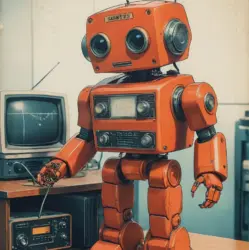If you got set up on the TigerVPN years back you may have noticed that their Android app no longer works. It’s an often-reported issue. Ironically, the not-officially-supported setup documented here does still work. A similar quick setup can get you set up quickly on Android:
Continue reading “TigerVPN with a Non-broken Open-source App”Pi-Star MMDVM Setup and Setting Up Callsign listener with Hearham.live
Pi-start is a way to make a MMDVM (available from Newegg and other retailers) a DMR digital repeater node to talk with digital radio. If you have a Raspberry Pi, sd and reader, and a computer, you can set it up…
Continue reading “Pi-Star MMDVM Setup and Setting Up Callsign listener with Hearham.live”Makerfaire is coming up!
The past 18 months or so have been somewhat different as far as availability of in person gatherings, meetups and Makerfairs, etc. but this year there are some changes for the better… If you are interested in Machine learning and computer-vision projects, come look at a couple demos at the booth at Central Oregon Maker Fair, Nov 13-15th!
Github Copilot Technical Preview Edition Review
If you have had the opportunity to be added to the Github Copilot preview, you may have seen the great new extension of auto complete they advertise – but is it all it claims to be?
Continue reading “Github Copilot Technical Preview Edition Review”Optical Illusions and Considering Minimal Examples to Explain
There is a very old “disappearing cyclist” puzzle, by Sam Loyd, you may have seen or seen a variation upon the theme. In Ben Sparks‘ video he gives a great overview:
Continue reading “Optical Illusions and Considering Minimal Examples to Explain”Scientists find the other ski after seven years
Have you ever lost one sock or one shoe after looking all over for days or weeks? Well don’t feel so bad, recently some scientists found their second ski at a research site after the ice melted for seven years!
Continue reading “Scientists find the other ski after seven years”Matt Parker’s new Video on Math Beeing Interesting
In Matt Parker’s recent video he looks into some interesting properties of the shapes commonly found in nature in bee’s hives:
Continue reading “Matt Parker’s new Video on Math Beeing Interesting”Hacktoberfest 2021 is here!
It’s been one year since the spammageddon of Hacktoberfest requests and issues with contributing to only accepted opted-in repositories – but this year there are some good changes:
You can now use Gitlab for PRs.
Monetary donations are also encouraged for open source projects.
You can either get a shirt or plant a tree, for completing 4 PRs with improvements to participating open source projects.
Also, of course if you have a project yourself you maintain, you can add “Hacktoberfest” tag to get participants to find your repo. 🙂 What are some of the projects you might consider helping?
Continue reading “Hacktoberfest 2021 is here!”Pine64 PineTime review
PineTime is one inexpensive yet very useful “smart watch”. If you want one that is open source, unlike those from Apple or Google, you will be glad to see this watch which is not only inexpensive but has software you can change (if you buy a dev kit version and know some wiring…)
Continue reading “Pine64 PineTime review”Book review – The Most Human Human
In Brian Christian’s The Most Human Human, he first explains some of the early experiments in human-like chatbots – Eliza the therapist and the more recent attempts to “understand” language through the vast equivalent documents the UN keeps record of.
He also goes in to the question that plagued early industrialism, will robots be getting our jobs with AI? Well, if something is a repetitive and arduous task, as he puts it, you are the robot. In the art world an actor may do a play for a weekend or two… and no more – is that a waste? In his words:
Continue reading “Book review – The Most Human Human”